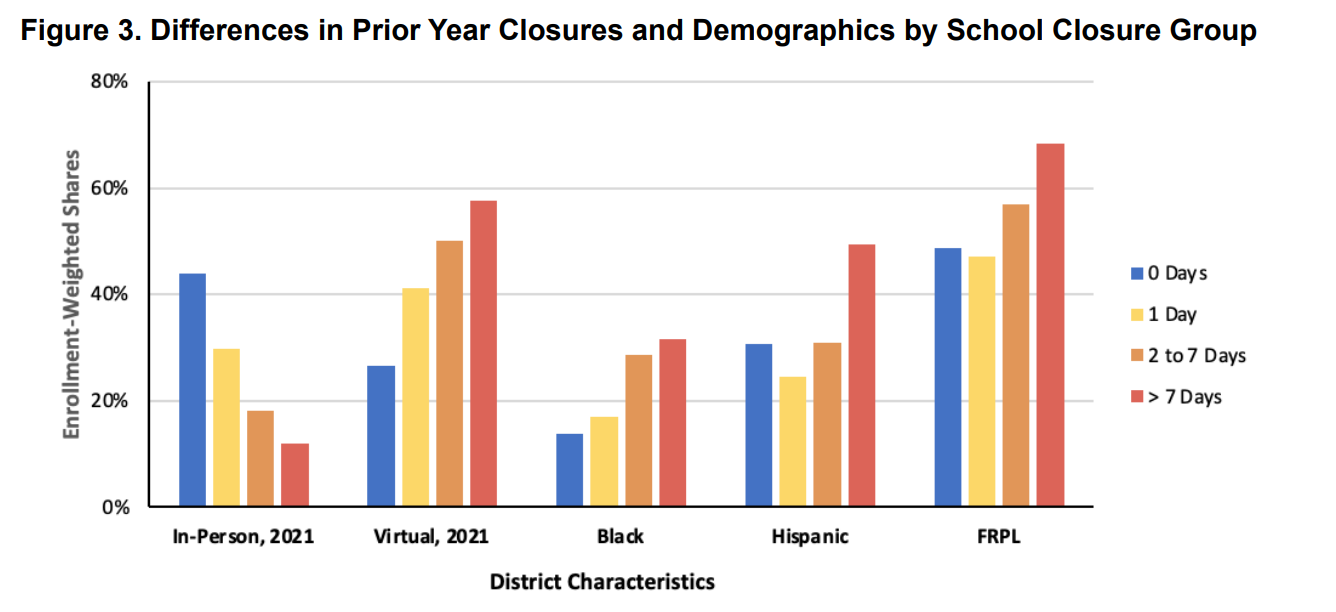Establishing a path to pandemic recovery for all students requires that we meet students where they are. Teachers should expand and personalize interventions for students experiencing disproportionate unfinished learning.
Last week I received a welcome email from my school district for one of my children. Portland Public Schools asked families with students receiving special education services an exciting question:
The Special Education Department would like your feedback on changing the Extended School Year program dates from July 5th -July, July 28th to June 20-July 1st and August 8-19. We believe that this would allow students to participate in both ESY and other summer programs offered by the district. Please take this short survey.
Many students with special needs have likely shown less progress towards their academic goals since 2020, thus qualifying for extended school year services in summer. Typically, extended school year and the districts' summer learning options overlap. So, students qualifying for extended school year instruction as part of pandemic recovery would have to choose between rich summer learning and a more personalized extended school year option.
PPS' approach is thoughtful and a guide for other districts that aim to provide personalized recovery options for students. This effort does a couple of essential things:
1. PPS is centering families' needs and wants.
Special education services are often legal and transactional. This leaves families feeling like they are being "processed," not cared for. PPS took an essential step before changing the policy. They asked families what would work best for them. This is a necessary movement towards co-designing services with families at the center.
2. PPS is advancing compensatory education.
There is ample coverage of students' unfinished learning during the pandemic. But, we are not discussing how to provide students opportunities to make up for the services they missed during school closures. Many families are unaware they can advocate for extended school year instruction to provide recovery options. The school district is advancing compensatory services by flexing the annual calendar. Adapting the calendar so that extended school year and summer learning do not overlap allows more students to receive compensatory education and rich summer experiences.
It is time for all school districts to develop clear, individualized recovery pathways for students. And student success relies on bringing families into this process early and often.
COVID-19
Smerconish | We need state health authorities to do more to promote non-partisan COVID vaccine rules for children.
NYT | Youth COVID-19 vaccine rates have flat-lined; we need to do more to increase how many children are protected from the virus.
K12Dive | If not COVID-19 testing, then what?
The Hill | A circuit court judge blocks Virginia Governor’s executive order on masks, ensuring that school boards can adhere to COVID-19 guidelines from the CDC.
Moderna | The FDA fully approved the Moderna COVID-19 vaccine for ages 18 and older this week.
Politico | The Biden Administration is preparing for a new COVID-phase in which we all learn to live with the virus. Maybe this is indeed our new normal.
Pediatrics | A new study evaluates the efficacy of physical distancing in schools for mitigating COVID-19 spread. The authors note that distancing may play a significant role in unmasked school settings.
Oster | A new study finds that school closures this winter are more common in districts that offered less in-person school last year and in districts with more students who are Black, Hispanic, and eligible for Free and Reduced-Price Lunch.
Pfizer | Vaccines for children under five could be available much sooner than expected.
NEA & AFT | Both teacher labor organizations, shared testing, quarantine, and isolation guidance resources.
NEA | NEA released a new database of COVID-19 testing resources for schools.
Burbio | Burbio released a new mask policy tracker covering the top 500 US districts and their mask decisions.
FEDERAL EDUCATION POLICY
Congress | Senate and House bills were introduced this week to establish alternative uses of some federal relief funds when in-person learning is not an option.
USED | The US Department of Education released a new discretionary grant program notice from the Office of Special Education and Rehabilitative Services. The grant will address personnel development for special and early childhood education service providers.
STATE AND LOCAL EDUCATION POLICY
DC | The DC City Council voted to increase early childhood educator pay via a new $54 million tax. The Office of the State Superintendent must ensure that the funds are distributed quickly to meet the deadline of this fiscal budget year.
NM | The New Mexico legislature proposed three bills to improve education for Native American students through increased funding and more autonomy.
Wallace | This week, Wallace also doubled down on high-quality, evidence-based summer programs.
NATIONAL POLICY AND ADVOCACY
CAP | The Center for American Progress released a new report dedicated to their growing work to support educational success for Asian American and Pacific Islander communities. They have outlined six initial areas of interest, including data, diversifying school leaders, and language preservation.
AEI | Replacing Justice Breyer means that congress will have little bandwidth to take on Build Back Better 2.0, argues Rick Hess.
AASA | We are in our second continuing resolution (CR) to keep the federal government from shutting down, ending on February 18th. Unfortunately, if Congress chooses to enter into a year-long CR, US schools will not receive the increase in Title I or IDEA proposed for this year’s budget.
EdTrust | Leading education advocates signed a letter commending the US Department of Education for their commitment to data collection and transparency with Maintenance of Equity requirements for federal pandemic spending. The letter also outlines ways the Department can continue to reduce burden through systematic state and local reporting efforts.
FEDERAL PANDEMIC AID SPENDING
ERS | ERS released a new set of tools for planning and implementing ESSER spending plans.
AASA | The national superintendent’s association is spearheading an effort to extend the timeline that districts can spend ARP ESSER funds on infrastructure projects to September 2026.
WI | Milwaukee school board approves ESSER spending on staffing, technology, and infrastructure upgrades.
USED | The US Department of Education and the National Comprehensive Center released a guide to how schools spend the American Rescue Plan funds.
TEACHING AND LEARNING
Education Next | Due to the pandemic, we need to redefine our conception of homeschooling so that it captures new student and family needs.
PDK | Jal Mehta argues that advancing American education will require a new “grammar of schooling.”
NYT | Will online tutoring work if being virtual is a barrier to relationship building?
ASSESSMENT AND ACCOUNTABILITY
NGLC | Interesting read on how to design and implement High-Quality Performance Assessments.
Fordham | Mike, and Checker discuss the differences between college-career ready and Carnegie Units.
ECS | Designing education reform for equity requires starting with transparent, standardized data.
AssessmentHQ | Given the influx of funds into US schools, there is a new need for reliable, standardized assessment data.
EDUCATION RESEARCH
IN | Unlike most research on preschool interventions, a new study from Indiana does not show fade-out effects. Instead, the study highlights long-lasting academic improvements into the fourth grade.
IES | A new report from IES details the characteristics of Black or African American teachers across the US. These descriptive data help inform future policy efforts to diversify the educator workforce.
Education Northwest | A new study from Education Northwest and the administrators’ association in Oregon revealed community and cultural capital variations that superintendents of color bring to their work. In addition, the report highlights the challenges and barriers that these leaders face, as well.
Annenberg | Observed math and reading declines for students in grades 3-8 over the first two years of the pandemic are more prominent than other school disruptions (i.e., natural disasters).
JAMA | A new international study finds it essential to balance the potential benefits of school closures with the adverse influence on mental health.
SOCIAL JUSTICE AND RACIAL EQUITY
Axios | Thirty-five states introduced legislation that may restrict teaching about America’s racist past.
Brookings | Mental health is a critical first step in addressing school shootings.
EDUCATION LEADERSHIP AND TEACHER SUPPORT
NASSP | The secondary administrator association created role-alike networks for supportive leadership conversations in this crisis.
NASBE | A new guide on the most critical questions about staff wellness during COVID-19.
UPCOMING EVENTS
Monday, February 7th (2:30 PM EST), OECD is hosting Trends Shaping Education 2022.
Tuesday, February 8th (10 AM EST), The Senate Committee on Finance holds a hearing on Protecting Youth Mental Health.
Tuesday, February 8th (12 PM EST), Allovue is hosting ESSER Myth Busting.
Tuesday, February 8th (2 PM EST), EducationWeek is hosting Enabling More Equitable Educational Opportunities.
Tuesday, February 8th (2 PM EST), EduDream and the Bill and Melinda Gates Foundation will discuss a new series exploring the standards-based reform era.
Tuesday, February 8th (3 PM EST), AASA is hosting Making the Most of Your ESSER Funds: Planting Seeds During Recovery to Grow Your Long-Term Vision.
Monday, February 28th (11 AM EST), The US Department of Education is hosting A Systemic Approach to Support Black Student Mental Health.
DID YOU MISS IT?
Send in examples of promising investments to the Education Recovery Hub!
If you need inspiration for deep relaxation, this is what #toddlerquarantine looks like in Portland, Oregon.
Dr. Christine M. T. Pitts serves as Resident Policy Fellow at the Center on Reinventing Public Education, overseeing policy leadership for research, advocacy, and government relations. A former teacher and administrator, she previously led research and evaluation for Portland Public Schools. She also served as Policy Advisor at NWEA, where she oversaw state and federal policy to advance equity and innovation in educational assessment. Follow her on Twitter @cmtpitts.








